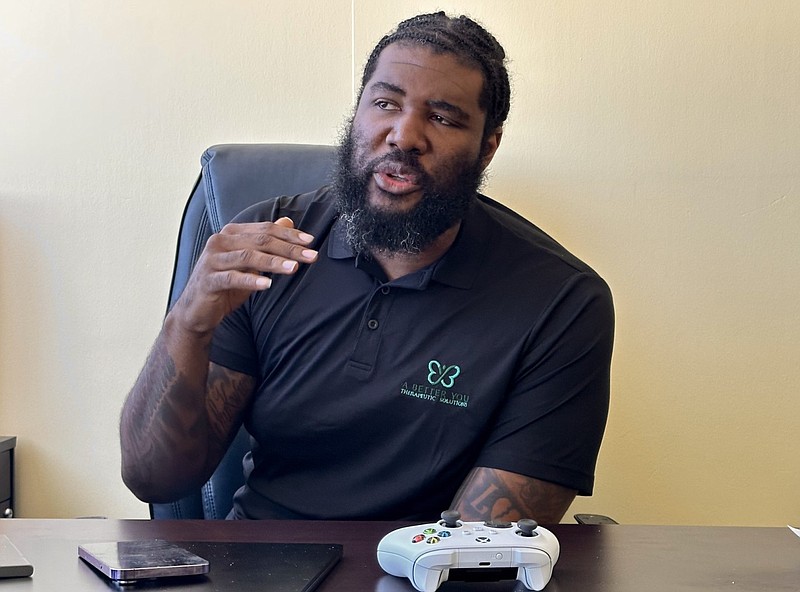The number of Black health care practitioners, both in medicine and mental health care, is disproportionately low in Arkansas and nationwide.
While research has found that Black therapists have more solidarity with their Black clients, only a handful of Black men practicing in Little Rock are on Psychology Today’s listing of mental health professionals.
In recent interviews, three of them describe the cultural apprehensions about therapy as well as the benefits they have seen their clients achieve. They also discuss not being able to meet the demand for services in central Arkansas.
Chukwuma Ekeh, who works at A Better You Therapeutic Solutions in downtown Little Rock, noted the growing visibility of mental health services.
“It’s on social media. Every issue has been tied or related to mental health,” he said. Mental healthcare startups are running ads on television and social media. Therapy is being promoted in churches. The 2021 reboot of HBO’s “In Treatment” starred Uzo Aduba as a Black therapist. Hulu’s “Unprisoned,” which premiered this year, stars Kerry Washington as a Black family and marriage therapist and Instagram influencer.
Ekeh said the most-common problems are issues clients have had for a long time but never talked about. They agreed that their adult patients are largely able to express the nature of their problems.
Ekeh said routine coping mechanisms for hurt or distress have been to hide the emotions or to act against others. Others lose motivation to do anything, impairing work performance, career advancement and romantic relationships.
“If I don’t feel great about me, I probably don’t feel great about you,” Ekeh said, leading to a lack of caring or effort in a partnership.
Andre Jones’ part-time practice, SolutionsCounseling Group , has male and female clinicians of color who primarily treat adults, couples and people in the military. A large majority of the clients are Black and most find him through word of mouth.
He also works at Little Rock Air Force Base, where he is embedded in a unit. Many of the airmen he sees there are young, newly away from home and having trouble adjusting to military life.
In his private practice, Jones sees a lot of undiagnosed or unaddressed depression. “Simply the stressors of being a Black man in America every day,” he said, from negative perception from others in public spaces to the well-publicized and widely broadcast recent incidents of police violence against Black men.
“I cannot tell you how many times I’ve heard, ‘Oh my God, this feels so good. I’ve never had anybody to just listen,’” Jones said. “The only way this can be successful is if you have the freedom to be exactly who you are. And the thing about it is, especially when it comes to Black populations, especially Black males, simply by walking through that door, you’re going to have somebody to understand your perspectives, your language and other cultural aspects.” Cory Dobbins, who offers couples and marriage counseling through the ArkansasRelationship Counseling Center, said communication is the top issue that brings clients, alongside intimacy issues.
“When you do this awhile, you understand that the pattern is the same,” he said. “They don’t understand it, they don’t get it, but I can see it.” He can therefore target past experiences causing trouble or mental blocks on emotions that inhibit bonds.
Ekeh said therapy is easier with teenage clients, who come much of the time because of social issues prompted by the pandemic or social media-related anxiety. He said short attention spans limit discussions. He includes activities during therapy sessions, including card games and video games, which is particularly good for reaching teens who would rather not be there.
Behavioral or interpersonal issues are what bring most of Ekeh’s youngest patients to him; successful therapy can lead to improved sense of self and confidence.
Dobbins said his clients in the school setting are dealing with self-regulation skills and impulse control, noting the importance in identifying the distinction between kids being kids and “maladaptive, abnormal behaviors.” “In this kind of setting, you just bring it to their attention,” he said.
“Say, ‘This is what your teachers say. This is what your parents say. This is what the school district says is a problem. What do you think you need to do?’” The therapists all said that part of the reason for the lack of Black behavioral health professionals stems from Black students not seeing a career opportunity. There is also bias against social work as a profession, given the perception that social workers are government employees who take children from their homes.
Ekeh said the 2019 closure of the 52-year-old Little Rock Community Mental HealthCenter , which had 2,500 clients when it closed, was bad for the Black community.
Many Black therapists also have at-capacity caseloads, which reflects the supply-and-demand imbalance.
“Even for a lot of the bigger clinics out here, they’re having waits of almost a month to get in,” Ekeh said. “Just for your initial intake, not even to start services.”
